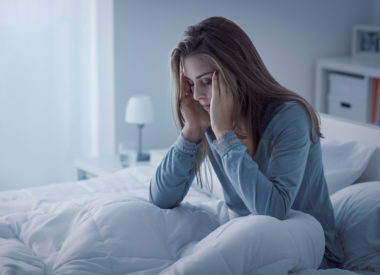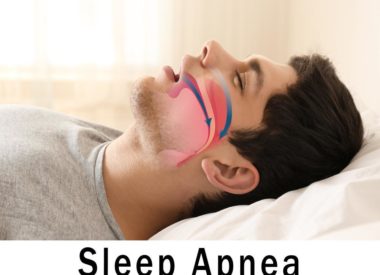Low Testosterone Therapy and Sleep Apnea
Recent research on sleep apnea, particularly obstructive sleep apnea (OSA) has revealed some shocking findings regarding sleep and a man’s libido. It turns out, there’s a relationship between low testosterone and sleep apnea. Men who don’t get enough sleep, have fragmented sleep, or have obstructive sleep apnea, tend to have low-T levels, according to a study in the Journal of the American Medical Association (JAMA).
Testosterone is a hormone. It’s produced by your body. Men mostly produce testosterone through their testicles, and most of theri testosterone is released while they sleep. Testosterone helps in building bone and muscle mass and stimulates the sex drive. There are several other functions it’s responsible for.
Sleep apnea is a chronic condition that often leads to sleep deprivation. It’s where you pause in breathing while you’re sleeping. These pauses can last anywhere from a couple seconds to minutes. Generally, you start breathing normally again, sometimes with a choking sound or loud snort.
Sleep apnea symptoms may include insomnia, excessive daytime sleepiness, snoring, sleep deprivation or episodes of no breathing. The below statistics reveal how prevalent both conditions are.
Number of People with Sleep Apnea
- Approximately 22 million people in the U.S. have sleep apnea.
- Around one to 10 percent of children get sleep apnea.
- Around 3.2 percent of men ages 20 to 44 have sleep apnea.
- Nearly 11.3 percent of men ages 45 to 64 have sleep apnea.
- Close to 18.1 percent of men ages 61 to 100 have sleep apnea.
Number of People with Low T
- Close to five million people in the U.S. have symptomatic low testosterone.
- Four out of 10 men who are 45 have low-T.
- Two out 10 men who are 60 have low-T.
- Three out of 10 men who are 80 have low-T.
Relationship between Low T and Sleep Apnea
Research has confirmed that there is a relationship between sleep apnea and low T. During sleep, changes in testosterone levels in both men and women occur naturally. These levels increase while you sleep and decrease when you’re awake. The highest levels of the hormone happen in your REM sleep. When you have a sleep disorder like sleep apnea, your amounts of REM sleep are reduced which often leads to low-T levels.
Evidence shows a strong relationship between low testosterone and a sleep breathing disorder like sleep apnea. This evidence shows that low-T levels often occur in men with OSA. These men are also more prone to suffering from associated complications like low libido, impotence, and erectile dysfunction.
Like men, women also have a chance of OSA affecting their sexual lives negatively. According to a few studies, there’s a connection between sexual dysfunction and sleep apnea in women. And as the sleep apnea gets worse, sexual function problems like decreased desire and sensation do as well.
Published research studied 207 men who were around the age of 44 and had sleep apnea. They were separated into four groups based on how severe their sleep apnea was.
- Group 1 (simple snoring): 32 men were added
- Group 2 (mild OSA): 29 men were added
- Group 3 (moderate OSA): 38 men were added
- Group 4 (severe OSA): 108 men were added
The results were that men put in the “severe OSA” group has much lower testosterone levels than those put in the “simple snoring” group.
Both the quantity and quality of sleep affect testosterone levels. Another study showed that men with low-T levels had less REM sleep, increased nighttime awakenings, reduced sleep efficiency, and more severe sleep apnea symptoms.
Importance of Getting Sleep Apnea Diagnosed
There is a low testosterone therapy risk with sleep apnea. It’s found to induce sleep apnea. Five testosterone deficient (hypogonadal) men were studied to determine the role that low testosterone therapy plays with sleep apnea. The men were treated for six weeks. After this six weeks, one man developed OSA and symptoms worsened in another man who already had OSA. Both men developed cardiac arrhythmias and decreased oxygen levels during sleep.
When you’re treated for your sleep apnea instead of your low testosterone condition, once your restorative sleep is restored, it actually causes your-levels to increase. Also, when you leave your sleep apnea untreated, you increase your risk of:
- Stroke
- Heart attack
- High blood pressure
- Decreased attentiveness
- Decreased productivity
- Even sudden death
A common method frequently used for diagnosing sleep apnea is a sleep study. You may have to stay overnight at the sleep center. This study monitors several functions while you’re sleeping including your:
- Eye movement
- Sleep state
- Heart rate
- Muscle activity
- Airflow
- Respiratory effort
- Blood oxygen levels
A sleep study helps with the diagnosis of sleep apnea and determines how severe it is. This will help your doctor devise a treatment plan for you for your sleep apnea. In some cases, you may even start treatment that same night in the sleep center.
CPAP Benefits and Low Testosterone Therapy
The treatment method that doctors choose first is usually continuous positive airway pressure (CPAP) therapy.
This therapy uses a mask that fitsover your mouth and nose and blows air into your airway gently to help keep it open while you’re sleeping. CPAP benefits include improved sleep, less fatigue during the day, more energy and quick results.
Other sleep apnea treatment methods could include a dental appliance that repositions your tongue and lower jaw or upper airway surgery where the doctor removes tissue in your airway. You can also make lifestyle changes that can reduce the severity of your sleep apnea. The National Sleep Foundation recommends:
- Avoiding alcohol
- Losing weight
- Quitting smoking
Alcohol can cause you to wake frequently during the night and it relaxes your upper airway breathing muscles. Losing weight can help cure your sleep apnea, not just treat it. Smoking swells your upper airway which makes your snoring and apnea worse.
If you’re noticing symptoms like low libido, low energy, poor concentration, daytime sleepiness or if your significant other tells you that you snore all the time or there are periods during the night where you pause in breathing , its time to consult with you doctor. You could be facing low testosterone and sleep apnea.
Your doctor will set up an appointment for you at a sleep center where you can have a sleep study done to confirm the diagnosis of your symptoms and come up with a treatment plan. Just remember, if you undergo testosterone therapy alone and don’t treat your sleep apnea, it can worsen your sleep apnea condition.
If you suspect that you might have sleep apnea as a result of low testosterone levels, you may need to be treated for sleep apnea at our Seattle sleep center, Sound Sleep Health, prior to your low T treatment.
Call Sound Sleep Health today at (425) 279-7151 to schedule an appointment with our Sleep Physician(s) today!



